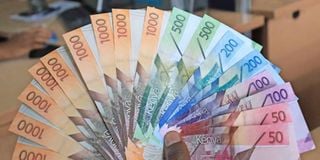Bulk bank cash transfers hit record despite tough economy

The value of bulk money transfers in real-time rose by 19 percent in March to hit a record high.
The value of bulk money transfers in real-time rose by 19 percent in March to hit a record high driven by a significant increase in the broad money supply in the economy.
Fresh data from the Central Bank of Kenya (CBK) shows that bulk transactions of more than Sh1 million through the Kenya Electronic Payment and Settlement System and Real Time Gross Payment System (KEPSS/RTGS) jumped to a historic Sh3.69 trillion in March.
This is a 19 percent increase from the Sh3.1 trillion that was transacted through KEPSS/RTGS in February.
The volume of these transactions also rose by 15 percent to hit a record high of 695,873 in March up from 606,702 bulk transactions in February.
The real-time transfers settled through KEPSS are debited and credited to the commercial banks' accounts held at the CBK, where the banks hold the required cash reserves.
The CBK last month migrated KEPSS to new global standards in a bid to boost real-time bulk transactions.
Dubbed the ISO 20022 message standards, the switch is expected to transform the exchange of financial messages by embedding richer data on the transfers as well as increasing the accuracy of vetting trading parties.
The value of the bulk transactions has been fluctuating in recent months affected by both macro and micro economic factors that are shaping the discourse of the struggling local economy.
The sharp rise in bulk transactions and the increased broad money supply in the economy over the past year were driven by a jump in lending by banks.
Broad money supply includes currency outside banks, private sector demand deposits held in banks, and non-bank financial institutions.
Broad money supply grew by 10.6 percent in the year to March 2023 compared to a growth of 4.7 percent in the year to March 2022.
The growth in March 2023 was mainly due to an increase in domestic credit, particularly net lending to the private sector, said the Treasury.
Further, inflows from the diaspora, which form a key part of Kenya's bulk payments system, have increased in recent months as economic conditions improve in some key source markets.
In March, diaspora remittances jumped to Sh49.13 billion ($356.98 million) up from Sh42.55 billion ($309.17 million) in February, an increase of 15 percent.
This comes as the economy slowed down to a growth of 4.8 percent in 2022 compared to a revised growth of 7.6 percent in 2021, according to the Economic Survey 2023 released this month by the Kenya National Bureau of Statistics.
During the year, all economic activities registered positive growth rates except agriculture, forestry, and fishing, which contracted by 1.6 percent due to suppressed agricultural production, owing to adverse weather conditions during the year.
Annual inflation has been above the CBK’s 7.5 percent upper bound target since June 2022.
The inflation rate increased to 9.2 percent in March 2023 from 5.6 percent in March 2022 driven by higher food prices attributed to supply chain disruptions, adverse weather conditions, and higher fuel prices.





